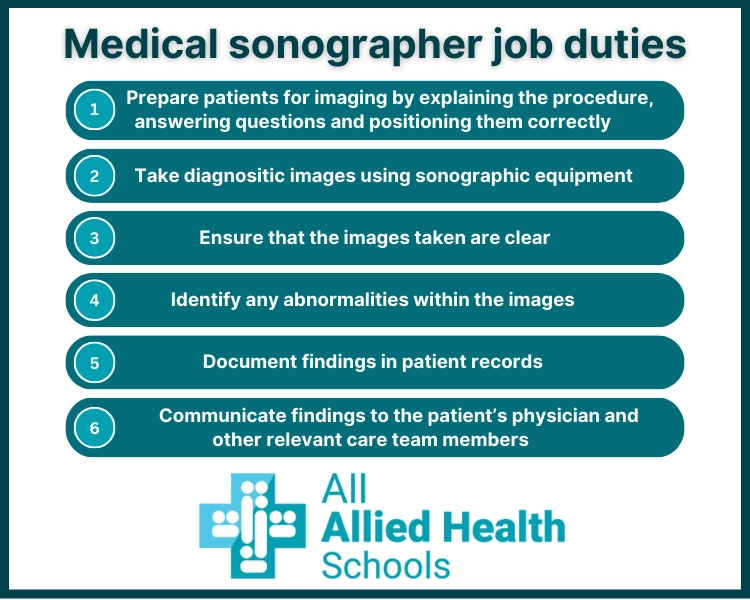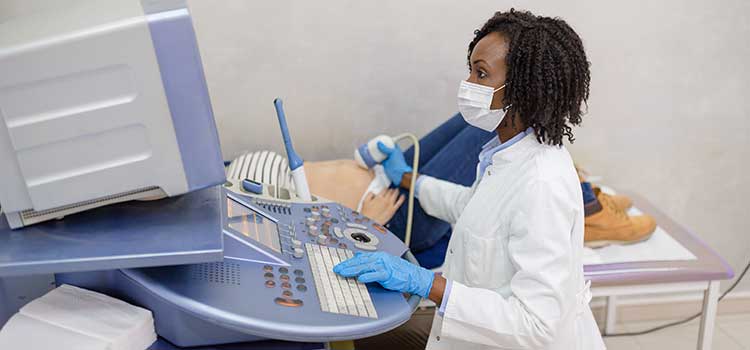In this Article

What Is Diagnostic Sonography?
Sonographers, also known as ultrasound techs, use ultrasound technology to create medical images of the inner body. These images help physicians and specialists diagnose, treat, and monitor patients.
“As sonographers, we use sound waves to make diagnostic images of the internal body without having to do anything invasive,” explains Kate Scrivens, a sonographer in Central Oregon.
The technology, which doesn’t produce radiation and is considered safe and low-risk, can create images of the vascular system, organs, tissues, joints, muscles, and fetuses.
Sonographers provide images, along with their insights and a summary, to a radiologist, who interprets the images. The radiologist or physician who ordered the images delivers the findings to the patient.
Ultrasound can be used to detect many medical problems, including:
- Abnormal growths, such as on the thyroid
- Blockages in arteries
- Tumors, such as cancer of the liver
Ultrasounds are also commonly used during pregnancy to monitor the growth of the fetus and the patient’s reproductive system, as well as to determine if the fetus is male or female.

4 Steps to Become a Sonographer/Ultrasound Tech
There are many reasons you might want to become a sonographer. “I love helping people,” Scrivens says. “And I get to see inside the body, how it works. It’s fascinating.”
Diagnostic medical sonography is a growing field and there are opportunities to specialize as you advance in your career. If you’re thinking about becoming a sonographer, here’s a guide to pursuing a career in the field.
Determine what education you’ll need.

It’s important to consider which educational path is the best choice for you, based on your finances, career plans, and responsibilities such as caregiving. There are three options: an associate degree, which takes two years, or a bachelor’s degree, which takes four. In addition, healthcare professionals who already have a degree and want to move into sonography can do so by earning a certificate, which takes one to two years.
Graduate from an accredited program.

Enrolling in an accredited program at an accredited school will let potential employers know that you have been taught and trained to the high standards of an accrediting agency. “Hospitals want to know you’ve gotten the best education. Going to an accredited school shows them you’re prepared,” Scrivens says.
Gain experience in the field.

During your sonography program, you will gain hands-on experience by working in a hospital or clinic. Working sonographers will help train you on the job so you can put into practice all you have learned in the classroom. If you have influence over what kind of clinicals you do, aim to get as much variety as possible. “That way, you’ll know if you like certain types of work or procedures,” Scrivens says.
Consider earning a certification.

Most employers, especially those in competitive markets such as large cities and high-paying areas, require certification. In fact, the more credentials you earn, the more you can stand out in a field of candidates. Gaining certification in several sonography specialties can make you more versatile and widen your job prospects.
What You’ll Do
Sonographers are responsible for operating equipment that produces and records images or conducts tests. These images are then used by physicians to make a diagnosis.
Most people are familiar with the role of a sonographer as it relates to pregnancy, but sonograms are also used to examine breast tissue, the brain and spinal cord, muscles, ligaments, tendons and joints, and organs in the abdominal cavity.
Like other allied health careers, you can specialize as a sonographer. For example, cardiac sonographers produce images of a patient’s heart, heart chambers, valves and vessels. A vascular sonographer focuses primarily on blood vessels and blood flow.
But a sonographer’s job requires more than just producing an image. You’ll interact with patients by preparing them for the procedure. You’ll also need a keen eye because sonographers must be able to recognize normal and abnormal images. Analyzing diagnostic information and providing it to the physician is another regular task.
Sonographers work primarily in hospitals, physician’s offices, and laboratories.
What You’ll Study
You’ll need to pass courses in the core sciences—biology, chemistry, anatomy, physiology, physics—as a prerequisite for many sonographer programs. Some programs prefer applicants with a background in science or experience in another healthcare profession, but many also will consider high school graduates with courses in mathematics and science, as well as applicants with liberal arts backgrounds.
Volunteer and work experience in healthcare can help you stand out among applicants.
In the case of professionals who already have an associate or bachelor’s degree in a healthcare field, a sonography certificate program is an option. Because these students already have a healthcare background, a certificate program focuses specifically on sonography.
In a sonography program, you will take classes with your cohort. Programs do not typically offer much flexibility to choose electives, so if there’s a specialty you’d like to pursue, you can request that your clinical work includes training in the area.
Diagnostic sonography programs may offer courses in:
As part of your program, you’ll also gain clinical hands-on experience in a three- to six-month internship.
Education Options
With several options to choose from, which sonography degree is best? Here’s a look at what each level offers.
Associate Degree
An associate degree in diagnostic medical sonography can open the door to entry-level positions in the field. Most programs last between 18 and 24 months and streamline education to impart fundamental knowledge and skills so that you can begin working as quickly as possible.
In addition to learning about equipment, sonography students can expect to receive a heavy dose of patient care education. Since sonographers interact closely with people all day, they need a strong grasp on how to interact with a diverse group of patients.
Mastering legal, ethical, and regulatory topics will also be necessary.
Bachelor’s Degree
Most sonographers hold an associate degree, but if you’re looking to move into management, earning a bachelor’s degree in diagnostic medical sonography could be the best path.
A bachelor’s degree usually takes four years and offers more opportunity to explore different ultrasound specialties. If you enter a bachelor’s program with an associate degree, you may be able to transfer some credits toward your bachelor’s, saving time and money.
Certificate Program
Healthcare professionals who already have a degree and want to move into sonography can do so by earning a certificate in diagnostic medical sonography. These programs generally run 12 to 24 months.
To enroll in a certificate program, you typically need one of these:
What to Look for in a School
Sonography programs are located throughout the country, but how do you know if the one you choose will give you the education you need? Consider some of the following criteria when comparing colleges:
Accreditation
Look for a sonography program that is accredited by the Commission on Accreditation of Allied Health Education Programs (CAAHEP), the Joint Review Committee on Education in Diagnostic Medical Sonography (JRC-DMS), or regional accrediting agencies. If your school and program are not accredited, you won’t be able to apply for federal financial aid or earn professional certification, which many employers require.
High-tech Facilities
As a sonographer, you’ll work with technology and state-of-the-art equipment every day. It’s important to find a school that offers instruction in a high-tech facility.
Once you’ve gained knowledge in the classroom, you’ll want to put your skills to the test with hands-on training. Be sure to tour a school’s facility and learn what type of access you’ll have to the labs on campus.
Externship Opportunities
One of the best ways to understand a day in the life of a sonographer is to get out in the field. Look for a school that partners with medical facilities or labs for externships.
Real-life experience is invaluable. You’ll be able to shadow a sonographer, ask questions, and learn about the challenges and rewards of the job. No textbook can offer that type of experience.
Sonographer Personality Traits and Skills
Education is just part of the process of becoming a sonographer. To do the job well, you’ll need a balance of people skills and tech skills. Here are a few to consider.
You Are:
You Should Have:
Salary and Job Outlook
According to the U.S. Bureau of Labor Statistics, the median salary for diagnostic medical sonographers is $84,470. Salaries can range depending on where you work, your experience, and other factors. The highest 10% earned more than $116,300, while sonographers in the lowest 10% earned $63,680.
According to the BLS, jobs for diagnostic medical sonographers are expected to increase by 14.3% through 2032, higher than average for all occupations. This means that now is an excellent time to consider your education and future career.
Career Advancement
Employers typically prefer to hire sonographers who have professional certification. You’ll want to take continuing education courses to keep your certification current throughout your career.
Earning certifications can be a professional advantage because sonographers certified in more than one specialty are expected to have the best opportunities.
If you enjoy diagnostic work, you can also advance in the medical field by pursuing a related career as a medical and clinical laboratory technologist or technician, a radiologic technologist, or a nuclear medicine technologist.
Since diagnostic medical sonography is expected to grow at such a rapid pace, now is a great time to get an education and become part of a thriving healthcare field.
What’s more, you’ll have the personal satisfaction of helping people with potential health problems. “As a sonographer, yes, I love scanning babies,” Scrivens says. “But I find this job rewarding, even in sad cases. You don’t want to find a problem, but if it’s there, you want to find it immediately. It’s good to help patients get what they need.”

Written and reported by:
Catherine Ryan Gregory
Contributing Writer

With professional insight from:
Kate Scrivens
Diagnostic Medical Sonographer, Central Oregon Radiology